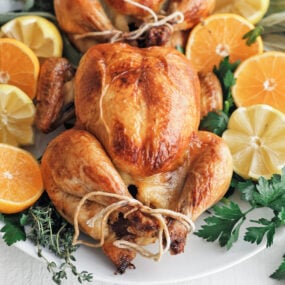

Brined Cornish Hens
Learn how to infuse cornish game hens with outstanding flavor and moisture with this Brined Cornish Hens Recipe.
Ingredients
- 8 cups water
- juice of 1 lemon
- 6-8 sprigs of fresh thyme
- 6-8 sprigs of fresh sage
- 4 garlic cloves
- 15 peppercorns
- ½ cup coarse salt
- 1 peeled large diced yellow onion
- 2 tablespoons sugar
- 2 Cornish hens
- 8 cups of ice
Instructions
- Add water, lemon, thyme, sage, garlic, peppercorns, salt, onion, and sugar to a large pot.
- Boil the mixture and ensure all the salt and sugar are completely dissolved.
- Cool it immediately with the ice.
- Transfer it to a large container.
- Place in the hens and keep them submerged. I like to add a few plates on top of them to keep them under the brine.
- Place them in the fridge for 12 to 48 hours.
- When you’re ready to cook them, preheat the oven to 400° with the convection on or 425 without it.
- Take the hens out of the brine and rinse them well under cold water.
- Next, pat them dry very well with paper towels all around and inside.
- Transfer them to a rack over a sheet tray. Fold the wings behind the body and tie the legs together with butcher’s twine.
- Bake at 400° convection on a middle rack for 50 to 55 minutes or until the deepest part of the breast reaches 165° internally.
- Remove and rest the hens for 5 to 10 minutes before serving.
Notes
Make-Ahead: The hens can be submerged in the brine for up to 48 hours before roasting. You can also roast the hens 1 hour ahead of serving them. Cover them with foil and keep them warm in a 200ºF oven until it’s time to eat.
How to Store: Once cooked and cooled, refrigerate the hens in an airtight container for up to 3 days. Or, wrap them tightly in plastic wrap and foil, then freeze them for up to 2 months. Thaw the hens overnight in the refrigerator before reheating.
How to Reheat: Place the Cornish hens on a wire rack fitted in a baking pan with 1/2 cup of water on the bottom. Cover them with foil and reheat in a 350°F oven for 15 to 20 minutes or until hot.
Any large soup pot and 3 to 5-gallon container should be big enough to hold the brine and both hens.
Do not brine the hens for longer than 48 hours. Otherwise, the proteins in the meat will begin to break down, become mushy, and taste overly salty.
If you’re short on time, a 4-hour brine will still impart flavor and moisture into the meat. However, a 12 to 48-hour brine is always best.
For the crispiest skin, pat the outside and inside of the hens very dry with paper towels. Moisture on the skin can prevent it from becoming crispy during roasting.
If your brined Cornish hens are browning too quickly in the oven, loosely tent them with aluminum foil.
Trussing (tying the legs together) helps the hens cook evenly and prevents the wings from burning. My guide on trussing a chicken with butcher’s twine will help you with this step. Remember to remove the twine before serving.
I highly recommend investing in a quality meat thermometer to ensure your hens are cooked to the perfect internal temperature of 165ºF.
Nutrition
Calories: 4232kcalCarbohydrates: 6gProtein: 39gFat: 468gSaturated Fat: 364gPolyunsaturated Fat: 13gMonounsaturated Fat: 64gCholesterol: 227mgSodium: 2992mgPotassium: 598mgFiber: 1gSugar: 3gVitamin A: 317IUVitamin C: 6mgCalcium: 61mgIron: 2mg